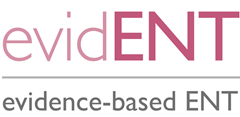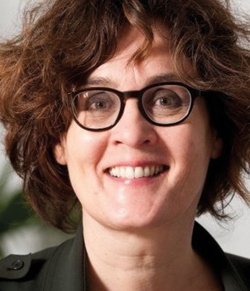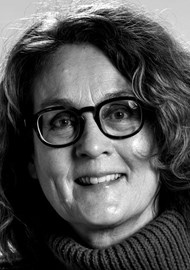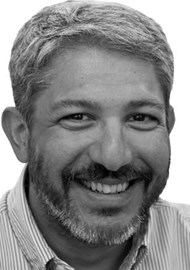Flying the flag for research in ENT, hearing and balance
Anne Schilder is an NIHR Research Professor and leads the evidENT team at the Ear Institute at University College London. She also holds a Chair in Paediatric ENT at UCL and at the University Medical Centre Utrecht in the Netherlands. She practises at the Royal National Throat, Nose and Ear Hospital. Professor Schilder is leading the way in promoting high quality clinical research in ENT, Hearing and Balance and fulfills many roles to achieve this: she is Joint Co-ordinating Editor of Cochrane ENT and Specialty Lead for ENT for the Royal College of Surgeons Clinical Research Initiative. Within the NIHR Clinical Research Network she is National and Local Lead for the ENT specialty. Here she speaks to Anirvan Banerjee for ENT and Audiology News about her pivotal role in developing a research agenda for ENT, Hearing and Balance, and what she envisions for the future of research in our specialty.
Anne GM Schilder.
What led to your specialisation in paediatric ENT and research?
As a young anatomy and embryology tutor at the University of Amsterdam, I was fascinated by the developmental anatomy of the head and neck and especially how apparently small deviations could have a lifelong impact. From then on, I was hooked on ENT. An elective research project on cleft palate and glue ear in 1986 with Mr Henry Grant at the Royal Ear Hospital in London sparked my interest in research. It is amazing how 25 years later, after completing my PhD and ENT training in Nijmegen, and 15 successful years as an academic paediatric ENT surgeon in Utrecht, I am back in London leading a wonderful team of talented young researchers.
You set up the evidENT team at the UCL Ear Institute. What are its aims and how do you see it developing?
I set up evidENT with the support of my NIHR Research Professorship to address the deficit in high-quality clinical research in ENT, hearing and balance. As ENT surgeons, we deal with some of the most common disabilities, deafness and dizziness, and with the infections that rank among the most common reasons for the use of antibiotics and surgery – but the evidence base for our specialty is poor. My mission is to change this by growing the next generation of clinical researchers to carry out high-quality, high-value translational research in ENT, hearing and balance. evidENT is a diverse team of clinical academics, quantitative and qualitative researchers and research support staff. We initiate our own projects and support those of clinical researchers across the UK. Regarding the future, evidENT is set to grow. We’ll have a full programme of translational research in operation by 2016, with both early and late phase trials, as well as PhD projects in the fields of health informatics and applied health research.

“evidENT is a diverse team of clinical academics, quantitative and qualitative researchers and research support staff. We initiate our own projects and support those of clinical researchers across the UK.”
Many people reading this will have completed the GENERATE survey or have taken part in a focus group. Can you tell us how far the GENERATE initiative has progressed?
GENERATE was initiated by ENT UK to promote high value research in ENT, hearing and balance. Central to this initiative is the development of a national agenda for ENT, hearing and balance research, to which end ENT UK teamed up with the British Academy of Audiology and the British Society of Audiology. My evidENT team was asked to lead the research priority setting exercise that will culminate in this agenda. Our Clinical Lecturer, Natalie Bohm, who has taken on this big task, has through the survey collected the views of almost 700 professionals and patients on which questions they want answered by research, and why. She has also organised five focus groups with patients and professionals discussing the same questions. This enormous volume of information was categorised into themes and a list of research ideas.
A group of experts and patient representatives helped us narrow this list down and the final setting of priorities was completed in the GENERATE Consensus Conference. The agenda was successfully launched in December at an event well attended by a diverse community of stakeholders, reflecting the widespread interest in this project. GENERATE is unique in giving both professionals and patients influence over the direction of ENT, Hearing and Balance research, so we are confident that it will be used to direct research funding in the future.
Following on from GENERATE, we are now working with ENT UK, the BSA and the BAA on MomENTum, a project mapping current UK research activity in our specialties. This map will serve as a valuable resource for those wishing to take on one of the projects listed in the agenda; it will help them identify experts and collaborators. It will also help our professional organisations identify what areas of research we need to grow further capacity and capability in.
You chair the NIHR Clinical Research Network: ENT Specialty. How does that link to your work to improve the evidence base for ENT, hearing and balance?
The NIHR Clinical Research Network (CRN) has been set up to enable all patients and health professionals working in the NHS across England to participate in high quality clinical research. It provides an infrastructure of research support staff in NHS Trusts who can help with assessing the feasibility of running a study in their Trust and applying for ethical approval and, most importantly, help recruit patients to commercial and non-commercial studies. It doesn’t matter if a patient or clinician is based in an academic centre or in a district general hospital – by having research support staff embedded in all Trusts, the CRN enables everyone to benefit from participation in research. This is an internationally unique and powerful system for clinical research. It is one of the reasons why I have chosen to continue my career in the UK; it really offers our specialty the opportunity to deliver high value clinical research and expand the evidence base for ENT, hearing and balance. To find out more on how your clinical research may qualify for CRN support and how to access this support, do take a look at the NIHR CRN website, http://www.crn.nihr.ac.uk/can-help/ or send an email to portfolio.helpdesk@nihr.ac.uk. The CRN has a dedicated Industry team that deals with any queries around commercial research; they can be contacted at supportmystudy@nihr.ac.uk. Our recent paper in Clinical Otolaryngology (http://onlinelibrary.wiley.com/doi/10.1111/coa.12318/full) gives a good overview of what the NIHR CRN offers our specialty.

“GENERATE is unique in giving both professionals and patients influence over the direction of ENT, hearing and balance research, so we are confident that it will be used to direct research funding in the future.”
You talk about ENT research in the UK, however I understand that Scotland is not covered by the NIHR and will therefore not benefit from these new initiatives; only England and Wales are included. Is this the case?
GENERATE is truly UK and has involved patients and professionals from Scotland and Wales and Northern Ireland throughout its process. NIHR CRN ENT specialty has representation from Wales, Scotland and Northern Ireland. In trials we work with sites in devolved nations. Researchers from devolved nations can apply for NIHR Research funding see http://www.nets.nihr.ac.uk/funding/devolved-administrations. So the initiatives are truly UK.
You are clearly passionate about clinical research in the UK! You are also working closely with the Royal College of Surgeons (RCS) as part of their Clinical Research Initiative. What is that doing?
The RCS recognised that only a very small percentage of government funding for medical research went to surgical disciplines, despite the fact that a third of hospital admissions involve surgery. In 2011, it set up the Clinical Research Initiative to develop a network of Surgical Trial Units across the UK, which specifically support surgeons to develop and deliver their research. The Surgical Trial Units work closely with the Surgical Specialty Leads (of which I am one, for ENT) to grow capacity and capability in surgical research. The aim is to increase the number of research active surgeons and surgical centres across the UK substantially in coming years. We are also supporting the development of research networks and trainee collaboratives, since they have proven very successful in engaging clinicians and trainees in high value research.
It is exciting that so many ENT trainee research collaboratives have now been set up and are really beginning to take root. For more information on ENT trainee research collaboratives see Richard Williams article in this issue’s Trainee Matters section.
Through the Clinical Research Initiative, the RCS actively engages with the trainees and has asked Specialty Advisory Committees (SACs) of various surgical specialties to reconsider their CCT requirements to enable trainees to participate more meaningfully in research. For example, the Trauma and Orthopaedics CCT currently requires all trainees to hold a valid Good Clinical Practice (GCP) certificate, and to either recruit five participants for high quality trials, or publish two first-author papers in a peer-reviewed journal. Trainees are going to be the researchers of the future – and the more exposure to research they gain, the more capable and confident they will be as future ENT surgeons active in research.
With such a wide involvement in initiatives and organisations involved in ENT, Hearing and Balance research, you must have a very good overview of research in the sector, and be in an ideal position to identify how it should develop.
Although it seems as if I have many roles, they are complementary, which is very helpful in being able to develop a coherent strategy to really push forward research in our specialty. The more evidence we have, the more convincing our case when requesting funding for ENT, Hearing and Balance treatments and care for our patients. Money is so often the bottom line, and through robust research, we can work to ensure that our patients continue to benefit from the very best help that we are able to offer.
Finally, with so much going on professionally, how do you find the time to relax?
I still split my time between work in London and my family and friends in Utrecht in the Netherlands, so I have the best of both worlds! My weekend starts with a gin and tonic at City Airport and the 40-minute flight helps put everything in perspective.
Declaration of competing interests: None declared.






